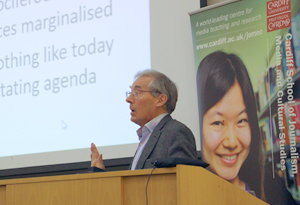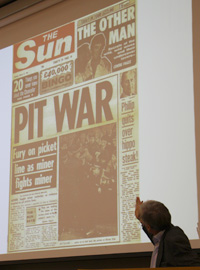“Here today, gone tomorrow” news reports can have a lasting impact
Posted by: Nicholas Jones
Introduction by Dr Andy Williams

On Tuesday 18th November we hosted a public lecture about the news media and the 1984-5 miners’ strike by the journalist and JOMEC honorary professor Nicholas Jones. It was a beautifully-illustrated tour through the newspaper front pages which set the wider media agenda during the strike, followed by a discussion of the differences modern social media could have made to the miners’ attempts to bypass state propaganda (the presentation slides can be viewed here).
The lecture prompted lively debate and coverage on Twitter (which is archived here) as well as in the room. The following is a reflection from Nicholas Jones on being asked by one audience member, Joyce Giblin from Newport (a former member of Women Against Pit Closures), to apologise on behalf of the news media for the one-sided and destructive coverage.
Being asked to apologise for the BBC’s reporting thirty years ago of the 1984-5 pit strike comes as no surprise to the journalists who covered the most divisive industrial dispute of post-war Britain.
To this day miners who took part in the strike accuse the BBC and the rest of the main stream news media of siding with Margaret Thatcher during the year-long struggle in which the South Wales coalfield played a pivotal role.
It was perhaps only to be expected that the bitterness of the National Union of Mineworkers’ defeat at the hands of Mrs Thatcher should resurface during my lecture hosted by Cardiff University, as it has during other talks I have given in the once mighty coalfields.

Former miners and their supporters from the wider trade union movement accuse journalists of failing to report the true extent of what they contend was police brutality on the picket line and for doing too little to highlight family hardship and for not recognising that the pit villages were in a fight to the finish to maintain the mining communities.
I have already acknowledged my own soul searching: in the final months of the strike broadcasters did become what I call the cheer leaders for the return to work.
Towards the end of the dispute much of my reporting for BBC Radio did concentrate on the return to work, the rate at which men, often in desperate personal circumstances, were being forced to abandon the strike.
They were known as the “new faces”, usually bussed in through picket lines. They were the heroes in the view of the national newspapers which had done so much to demonise the NUM President Arthur Scargill.
Looking back I accept that perhaps radio and television were doing Mrs Thatcher’s job for her: by focussing our coverage on the weakening support for the strike we were helping to hasten the day when half the men were back at work and Mrs Thatcher could claim victory, which is precisely what she did, forcing the NUM to vote narrowly to abandon the strike without an agreement.
While I am hardly in a position to apologise on behalf of what was then known as Fleet Street, I do acknowledge the danger of broadcasters getting swept along by the newspapers’ agenda and ending up, as happened in the pit dispute, in promoting the government’s line.
The demand of the former strikers – which came through so loudly during questions at Cardiff University, as at other public lectures – is that journalists should admit they were in the wrong and apologise for peddling government propaganda.
The statistics for the return to work were always challenged by the NUM but it was the figures issued by the National Coal Board which made the headlines, and of course, there was the television footage to back up the story line, as more and more buses went through the picket lines taking men back to the pits.
Looking back on how we reported events decades ago is always a salutary lesson for journalists: we might think our reports are “here today, gone tomorrow” but what we write and say often does having a lasting impact and I readily accept that reporters should be held to account, even if that day of reckoning is long delayed.
Nicholas Jones is an Honorary Visiting Professor at Cardiff School of Journalism, Media and Cultural Studies

